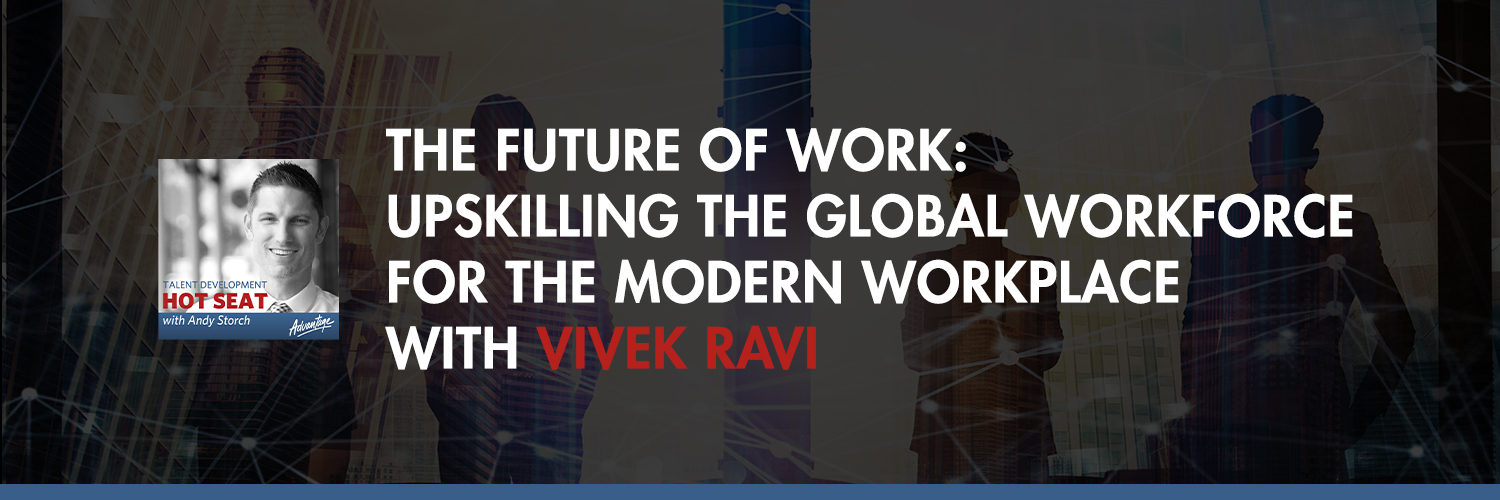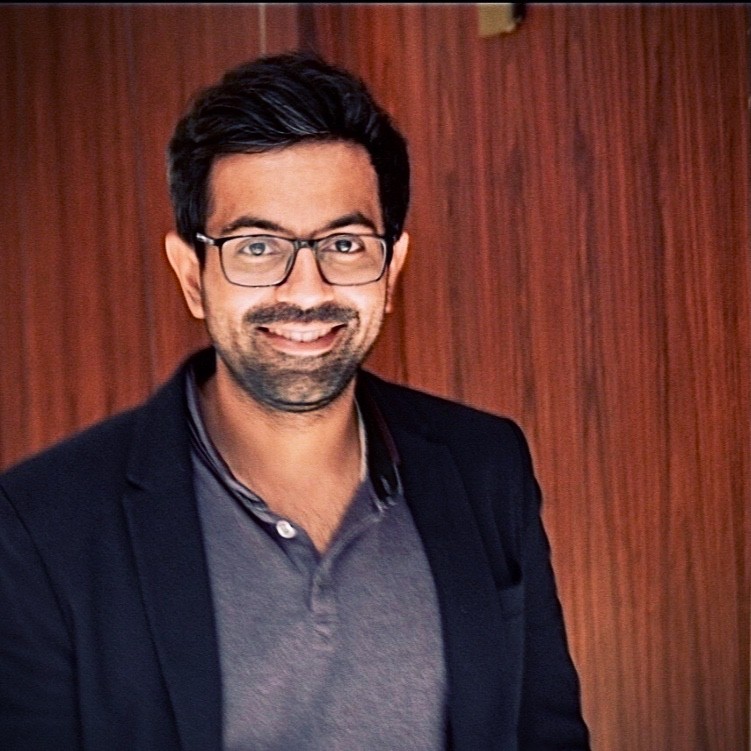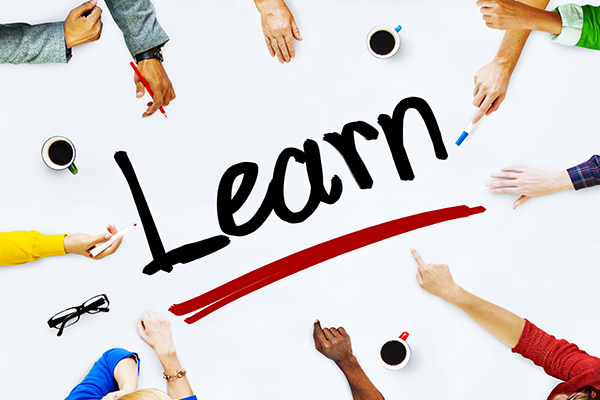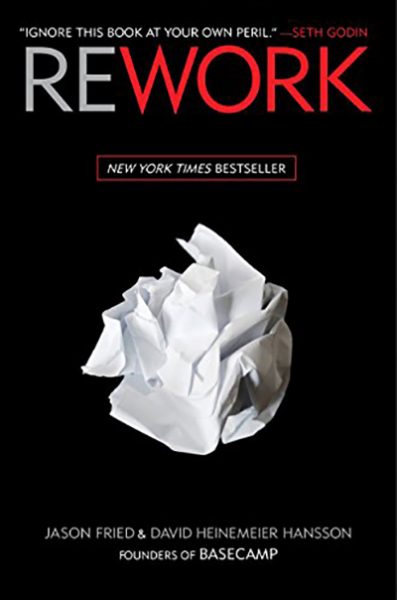
The future of work: Upskilling the global workforce for the modern workplace
There is a lot of focus that we put on building adjacent skills in people so that people are not one-dimensional.
Upskilling at scale: Vivek Ravi on how TCS helped 450K employees gain 2.8 million new skills
With social distancing becoming the new normal, the COVID-19 pandemic has pushed many of us to work remotely. For some, migrating to virtual workplaces is an entirely new mountain to climb. However, seeing where businesses are heading now, upskilling for the future means moving towards the digital experience. Hence, it has become critical, now more than ever, to harness our skills for the virtual world.
Andi Storch brings over someone who is an expert in these areas, Vivek Ravi. Vivek is the head of Talent Development, North America for Technology, Collaboration & Strategic Initiatives at Tata Consultancy Services (TCS). He is also an HR consultant, design thinker, digital humanist, and public speaker passionate about topics such as the future of work and the modern workplace.
As the world rapidly changes, with the workplace turning to virtual and the workforce becoming global, it has become necessary to embrace this digital transformation. One way to start is by investing in your existing talent, upskilling them by providing opportunities for learning. That way, you will have the people you need to take on the ever-changing work environment.

Listen to the podcast here:
The future of work: Upskilling the global workforce for the modern workplace with Vivek Ravi
How TCS helped 450K employees gain 2.8 million new skills
I'm joined by Vivek Ravi, who is the Head of Talent Development for North America for Technology, Collaboration and Strategic Initiatives at Tata Consultancy Services. He's also an HR consultant, design thinker, digital humanist and public speaker who's passionate about topics like the future of work, employee experience and the modern workplace. I'm excited to have Vivek on to talk about those things. Vivek, welcome to the show.
It’s a pleasure, Andy. I’m looking forward to this conversation.
It's great to have you on and it’s interesting that we connected on LinkedIn. I was very interested in some of the things that you're doing and you've been speaking about these topics like the future of work, digital learning and employee experience. They're things that have always been relevant and important, but probably more important than ever, as we're sitting here in the middle of this COVID-19 crisis, and everybody's working remotely for the most part. I'm excited to dig into those things. Let’s start with a little bit of background, who you are and how you got there.
Like most kids in India, I was an engineer by design. I did my computer science engineering from one of the reputed colleges back in India. I worked for a bit with technology. I did a master's in HR. I went on to take up some HR roles and eventually went on to build a lot of tech for HR in TCS. I've worked for years with TCS and that's probably been my only company with which I've had such a long stint.
Can you tell me more about your role at Tata?
I head talent development for all technology and strategic initiatives here in North America. I wear 2 hats for my role. One is, I'm responsible for all the internal upscaling of all our internal employees. In technologies and domains, the web, we have a lot of demand that we see internally. I've also been working at building collaboration tools for ourselves from scratch. The virtue of having done that, having built a strong collaboration ecosystem internally, a strong talent technology platform internally, and having dabbled with a lot of old 365 technologies. I also happen to do this around reimagining workplaces and the future of work. I consult around this for a lot of our customers and help them in their workplace transformation journeys.
[bctt tweet="Creating a great employee experience will then create a great client experience." via="no"]
Upskilling your employees
You do a lot of internal work with the internal upskilling of employees and the talent ecosystem, but also working with clients and helping them design their future of work or the modern workplace.
Yes.
Let's start with the internal work and the employee experience that you're creating there. You talk about upskilling employees. What does that mean for you at Tata? Everybody has different definitions of that, so when you talk about upskilling, what does that mean?
The way I put this is investing in existing talent and giving them all the opportunities to learn. Giving them the best of the roles possible. Making sure they are groomed for a role has been at the center of TCS’ talent strategy for a long time. When I say upskilling, it's about identifying areas where there is a lot of demand for us. Identifying potentially suitable people who have the ability to upskill themselves or incrementally add to their skillset portfolio to be able to fulfill these requirements for us.
Also, to enable a learning path that is seamless in-depth and equips them enough to be able to deliver effectively in these roles. That, in a sense, is what upskilling for us is, but another key part of this is also cross-skilling. There is a lot of focus that we put on building adjacent skills in people so that people are not one-dimensional. We define them as digital industry or somebody who has at least 5 skillsets. How do we help people gain the skill adjacencies, so that at times when needed, we can easily have them pivot from one industry segment to another and from one technology segment to another, thereby making our workforce extremely agile.
I've done a little bit of studying on the future of work, maybe not as much as you, but one of the things I think about a lot in what is coming is that companies and employees and people will be operating more on a project basis than a traditional role. It sounds like what you're doing helps prepare people to be more agile and move around from one project to the next, instead of thinking that they need to stick in one place or one role.
Yes, because providing multi-dimensional opportunities for our employees has always been our strength. For the size and scale of our company, you name a technology, name an interesting new skill in the market, there is something that we are delivering to one of our customers with our wide portfolio of customers and projects that we have. It's more a win-win for us to have a workforce like that. This also is one of our key USPs when it comes to enabling careers for our people. Eventually, it helps us build a strong linkage between learning and career opportunities.

Upskilling at scale: Upskilling is investing in existing talent and giving them all the opportunities to learn.
How do you go about doing the upskilling where you're giving employees the right amount of learning and career opportunities? Do you have major programs in place? Is it more the responsibility of the employees? How do you transfer that and make that available?
I am going to take you through a story, which I think is probably one of our biggest accomplishments at TCS when it comes to our talent transformation. The way we have used technology to upskill our workforce at scale, that by itself has been an exciting journey and I've been fortunate enough to be a part of this. A few years back, we realize that the speed at which the industry was changing, and the amount of upskill resources that we needed was exponentially higher than what a traditional boot camp model could deliver. Like putting somebody in a room, asking somebody to take a webinar or putting somebody who has 10 years of experience to teach a technology just doesn't work to help us scale at speed.
We started building our talent ecosystem and own microlearning platform. Through that microlearning platform, we took an experience-first approach to learning. We said, “Learning is not a transaction anymore. We curate a great learning experience for you.” When I say curate a great learning experience, it's about providing them integrated content, multimedia content. Like videos and games. All of this curated into microlearning cards that they can browse through anytime, anywhere, and learn. A key part of this is not just learning theoretically, but giving them an opportunity to code and practice hands-on technology coding through sandboxes, online hackathons, and all of this. For us, through this ecosystem, potentially in about 2.5 years from when we started, we have been able to upskill almost about 2.8 million digital competencies in our employees. When I say 2.8 million digital competencies, I'm talking about 450,000 people across the globe who have amongst them 2.8 million skills cumulatively.
Digital learning
That's a lot of skills. That's huge and 2.8 million skills, you've got to be able to do learning upskilling that can scale. I know when we chatted before you said one of your specialty and passion is around digital learning. What's the approach to creating learning that scales for so many people?
The way I would put this is the best of the learning content today is available open-source. If people want the content to learn, they can find it on YouTube or any of the third-party sources that they have. What makes a compelling case for somebody to take up learning and make meaningful outcomes out of that is the learning journeys that you can curate to people. The minute we started shifting our focus, from creating content to creating learning experiences, learning journeys, we were able to take a more macro view of this whole ecosystem. We started looking at what are the other external resources that we can leverage so that we focus on doing things that only we can do and bring together a lot of these open-source learning content and enable these learning experiences for people.
You're building out these digital capabilities. Do you have partners? Are you building everything internally? People want to know more about how you create this stuff to scale to such a huge organization.
[bctt tweet="We should not spend a lot of time thinking about problems that don't exist. Just get started and then figure out the problems as they come." via="no"]
The way I'll put it is the spine and core of our learning systems are all internal. We built it from scratch by ourselves. We have an LMS that we built from scratch for ourselves that keeps track of every single learning object that any employee in TCS takes. We have a bunch of content partners that we have worked with. Various best-in-class learning content providers available in the market. You can name one of them and they are our partner. The way we've done this is we've integrated their content into our ecosystem. Where we don't have content ourselves, we go to their content.
Our microlearning platform that I spoke about curates content from various sources, enables these learning journeys for people and uses a lot of persuasions to drive this amongst people. For example, if you are an aspiring data scientist, based on your existing skills, the platform would be able to put together a set of curated courses. It’ll say, “Andy, these are 25 courses that you need to do from now to get to this aspirational level of data scientists that you want to be.” It curates different learning contents from all these sources and enables a single learning experience for you. The system, interestingly, also identifies areas when you slack and say, “You're dropping the ball. Get started and continue learning.” There are these gamified matches that the system also has so that the entire experience is fun.
Is it using AI and adaptive learning to learn what people are doing and make recommendations for the next thing?
Yes, parts of what we do use AI adaptive learning and all of that. We're still doing a lot of experiments to expand our ability to curate this more accurately.
Do you do classroom learning as well? I'd imagine that would be difficult to roll out with that many employees.
Interestingly enough, we do a lot of classroom training. Almost a large sizable number of our training is also classroom led because we strongly believe the experience that a classroom training delivers especially for a lot of our deep skilling programs. It’s important because it brings together various facets that online learning does not deliver to people. With that said, we also have interesting ecosystems called iClasses, which give you an in-classroom experience, but in an asynchronous mode. This means you can be in any part of the world, get into one of our iClasses, and have instructor-led classroom experience, in respect of where you are or where the instructor is.
In the US and Canada, we also have an interesting concept called playgrounds. These are hacker style learning spaces that we've set up, which have all the infrastructure, the challenge banks, and a whole bunch of learning resources available to you. You can just walk in and there are a lot of boot camps that happen. There's a lot of hackathons that happen there. You can walk in, pick up challenge statements, take your friends, and learn. Classroom training is a very important part of all the trainings that we do. We make sure we don't lose focus or we don't take the component out of our learning ecosystem.

Upskilling at scale: Technology can just be an aid. It is more about the people and how you use it to drive behavior.
Shifting towards digital
I'm glad to know that. I think that the best organizations are doing a mix of both and still giving people that in-person experience when they can and also making a lot of digital and virtual options available. We are in the COVID-19 pandemic and classroom learning is not a possibility. Everybody's quickly shifting towards digital and virtual. I know for a lot of my clients, we're moving a lot of programs to virtual or postponing some in-person workshops. I'm curious how the transition has gone at Tata with such a large employee base. With many people already working remotely, but as you told me earlier, a lot of people also working in offices. How has that transition gone? How have you managed it to make it successful?
With the advent of this pandemic, we quickly came up with a framework that we call secured boundless workspaces. Our teams showed a lot of resilience and pulled through miraculous enablement of this for almost 400,000 people within a span of 2.5 weeks across the globe. Making sure everybody had resources to the same amount of technology that they needed and the same amount of computing power that they needed. We did all of this at footing and in less than 2 weeks, we've almost been able to seamlessly transition to this mode. It had no impact on our delivery to our customers.
That's a major achievement, if I may say so, for us internally. Because for us the focus on customers and being able to deliver to them has always have been one of the most important things. That said, for a function like talent development, our internal customers have always been our employees. Employees have been at the center of a lot of things that we do, even as a company. Along with this whole transition to SBWS, all the investments that we had already made in these digital technologies or digital learning resources came in handy for us with very little time spent on this.
We spun around all our instructor-led classroom sessions to virtual collaborative sessions. Some through Microsoft teams. Some through all of our other collaboration platforms. Also, enabling things that you know, we resisted doing in the past, like whiteboarding online. Given the situation, we figured out ways around design thinking workshops with multi-location whiteboarding happening online and things like that. The way we've been able to transform our ecosystem and deliver almost anything and everything that we were doing before in a virtual mode have been a great learning experience and a fun experience to be part of.
Keys for successful HR and employee experience
It's been a challenge for everybody but it sounds like you were set up fairly well going into this and had a good system in place to get everybody moving. I would imagine that the HR organization, as it did in many organizations, played a big role in making this successful. What would you say would be 1 or 2 keys to success for the HR organization that helped the company overall to make this transition?
If I may put it in two words, one is empathy. Empathy towards our employees. Two is the resilience and the resolve to keep the lights on. These two have always been at the center of what our HR team is and a lot of our support functions have been doing. Those have, in more senses than not stood testimony has been the two words that will describe most TCS-ers.
[bctt tweet="By helping our employees in their careers, we eventually help ourselves also." via="no"]
I've been studying this idea of leading through crisis and we have a new solution. One of the big learnings is empathy. It’s so critical to lead through a crisis like this. Understanding where people are coming from. There might be different concerns, different challenges and no one solution is going to fit everybody right. The more empathy we have, the more successful you're going to be in creating that better employee experience. Speaking of employee experience, I know that’s something that you've done a lot of work on. In your words, what do you think is essential to create a successful employee experience?
The most important thing would be to first put yourself in the shoes of an employee and then think through the whole thing. Be extremely dispassionate about your processes and its administration. That gives you a big head start in terms of designing a great employee experience. Second is trying to keep it fairly simple for them to consume. Take it to a place where they already exist, instead of building a platform and looking at it like a technology-centric solution. Try and see if you can build a solution at a place where they're already collaborating. These two can do remove a lot of friction in terms of any solution that is being conceptualized. Employee experience, if you ask me, is a really wide area to be talking about. Do you have any specifics around the employee experience that you'd want me to share my experiences on?
There are many companies out there trying to create a better employee experience and there are still far too many companies that don't think about that at all. They talk about customer experience and customer success, but the way I've looked at it, your customer experience is never going to exceed that of your employee experience. If you don't treat your employees well, you can't expect them to treat your clients or customers well. It sounds like, is your company focused on creating that great employee experience so that they will go and create a great experience for their clients?
I can't do anything but agree and resonate with you on this. The point here is, I'd like to call what we live in now as an experience economy. People who come to work now come to work having hyper-personalized experiences in their everyday life. Facebook, Amazon, Google, everything is personalized to you. What you see is different from what your family member or your friend sees. In most organizational contexts, let's take something like a basic intranet.
If I were to say, let alone hyper-personalized experiences, even personalized experiences, there are big challenges. In most cases, they are a standalone platform where it's a one size fits all approach. Things like this always create friction between what your employee experience is in his or her everyday life versus what they experience in their workplace. Trying to bridging the gap here and trying to build personalized experiences in places like the intranet is probably a great place to start with.
If I were to give you an example, there was one customer who we were working with to do this, we ended up building an intranet for a major airline company for their pilots. The way this works is the platform understands if you're a pilot or a crew and gives you curated options on your screen. It even understands if you are on the roster and you're flying a plane. It only gives you the most important flying manuals that you need to see on your intranet and does not probably ask you to apply your leave, which you didn't do last week. Things like these could be really small, but if you look at it from an employee's perspective, they make a big difference. Each of these is frictionless.
The platform that we made also raises some interesting things like if you raised a travel request. It would say, “I know that you're traveling from point A to point B. Here are some other people that you know who are also traveling from this place to this place around the same dates. Why don't you go ahead break the ice with them and have a conversation so that you can have a friend when you're traveling?” Things like these are potentially what I mean by employee experience. Those are the areas where we've been doing a lot of work.
More about Vivek Ravi

Rework
That's getting smarter about where employees are going, what they're doing, creating a great experience for them, and helping them build a network. I want to shift gears with a few questions about you. What has been your greatest accomplishment or proudest moment in your career so far?
I'd say it's more of the team that I've been part of, not just me, but I've been extremely proud of the way that we've built our talent ecosystem internally from scratch. Some of the platforms that I've been fortunate enough to work with and be part of this whole experience of building our ecosystem that's been a humbling experience for me. The way we've put purpose at the center of learning and try to link learning with careers. Making sure it meets our business objectives. Our business teams have a robust talent pipeline at all times. Our ecosystem fuels that pipeline and make sure we have the talent engine available for our business expansion. The third part around this is how we've never made learning a mandate. We've left it for people to choose their learning paths and how beautifully we used not just to bring these three pillars together to fetch business results for us. That's something that I'm proud of.
Those are things to be proud of. On the flip side, what has been one of your biggest failures or mistakes? What did you learn from it?
This is more of a personal thought process that I was in years ago before I stepped down to doing a lot of these things. Like most of the people, I also had a very technology-centric view on a lot of these occasions. I always thought it was about a tool or a technology that can solve a business problem for us. Having been part of this journey, I now realize much better than in the past that it's not just technology. Technology can be an aid, but it's more about people. It's more about how you use technology to drive behavior.
People talk all the time about technology and sometimes I forget that it's people that are making the technology, using the technology and still people that are driving all the results in the business. We can't lose sight of that. You are intimately involved in thinking about the future of work and the modern workplace and where all of that's going. What trends if any, are you following in talent development?
My favorite trends have been around microlearning, just-in-time learning, and gamification. If you ask me, technology now is much easier to learn than in the past. You don't need to spend years trying to master technology. Increasingly, a lot of new skills are even getting commoditized. For example, AI is not even a core developer kill anymore. There are a lot of AI engines that have made them consumable services. As a company, we've been embracing and staying on par, if not ahead of the curve, has been around microlearning, gamification, and just-in-time learning.
[bctt tweet="A lot of innovation will only happen at the edges." via="no"]
Those are big ones. Microlearning keeps growing. I like the idea of just in time and gamification. From a learning perspective, I usually ask my guests for a book recommendation. I wonder if there's a book that has made a big impact on you and you recommend often, maybe a TED talk, or some other learning resource.
My personal favorite all-time book is this book called REWORK. It's a phenomenal book where the author is talking about your view of the art of possible. What is real in the real world. It doesn't necessarily have to be defined or confined by what somebody else feels. They talk a lot about incremental increases over perfection. How we should probably not spend a lot of time thinking about problems that don't exist, rather just get started, do something and then figure out the problems as they come. I can keep going on and on about some of the quick lessons that the book offers, but for anybody reading, without batting an eyelid, I probably say REWORK is a book that you should all read.
I haven't read that one. That's REWORK by Jason Fried and David Hansson. Last question for you, Vivek. For anybody reading, who is in HR talent development, looking for ways to accelerate their career. Get to the next level, and be more successful. What's one more piece of advice you would give?
I'd rather say these are reflections from a lot of thinking that I've done to myself. One is, we all have the power to influence a lot of our employees, take them along and help them in their careers. By helping them in their careers, potentially, eventually, we help ourselves also. Two things that I've been consciously focusing on is, spreading the message with a lot of people that I interact with. It's time for us to help people aspire to be generalists.
The way the industry is progressing forward, it doesn't need specialists at scale anymore. When I say generalists, we're not talking about people who are the jack of all. We're talking about people who have multitudes of skillsets at reasonably good levels of expertise. They can have 5 skills that they know enough to get their hands dirty, figure out, and then find solutions to. That's something that will be good for us to potentially evangelize. The second thing would be to keep in mind that a lot of innovation that will happen from here on is going to happen at the edges.
When things like that happen, it becomes extremely important for us to keep our minds open and think out of the box. We continuously question things that we felt cannot be done. Eventually, attempt solving some of those problems would mean that we thought we potentially can't. Some of the solutions that we may find might startle ourselves. One of the biggest examples that we can all look for look at is how the world has spun itself to a virtual economy and a virtual ecosystem in the wake of COVID. Things that we all thought that was never possible to be done virtually. Things like weddings or funerals, all of them are happening virtually. That's probably something that we can always reflect upon when we think something can be done.
People would have thought that was crazy before the pandemic. You told me that you attended a wedding on Skype. I've been invited to birthday parties on Zoom. Another colleague of mine told me that she attended a funeral on Zoom. We are keeping the socializing going during social distancing using all the technology that's available to us.

Upskilling at scale: It is time for us to help people aspire to be generalists. The industry doesn't need specialists that scale anymore.
Yeah, and I’ve been hosting a lot of quarantined parties for my team. I love it. I look forward to Friday evenings where we all get together, have a lot of fun, meet our family members, and our pets. It's a lot of fun. It helps us unwind. Thinking of this, even when things get back to normal, I strongly believe the new normal will be very different from what the old normal was.
There are many benefits that will come out of this. One of them is what you said. People could be more connected, especially in a completely more human way where you're getting to know people not just at the office, but seeing their family members, pets, children, and things like that. I've done some of those calls on Friday afternoons as well and it's cool to kick back, socialize and meet people's families and things like that. It's a nice benefit that's come out of all of this tragedy. I appreciate you taking the time to come on to share some of your experience and expertise. I know you've done so much of this work in the future of work and modern workplace, things like that. We covered a lot regarding employee experience and things. Thank you so much for coming on the show.
Thanks, Andy, for having me over. It was fun and very insightful, interacting with you. I hope to have a lot of conversations offline and brainstorm. I love the conversations that we've always had on LinkedIn. I hope to keep that going.
We will. Thanks. Take care.
Thanks, Andy.
---
I hope you enjoyed that interview with Vivek Ravi. There are many great points in there and things that we can learn from. Vivek said something to me after we stopped recording that I wanted to add on here because I think it's inspiring and something a lot of organizations could potentially take and run with, without too much additional cost or investment. He said they're doing something called a 50k Learning Challenge in North America. The goal is 50,000 learning hours inside of, I believe, 2 weeks, it might have been a month. Your number is going to vary based on how many people you have in your organization. Their HR talent development team is all hands on deck facilitating this. Making sure learning is available and a priority for all of their workers in North America.
Their goal is 50,000 learning hours during a certain period of time and they're donating money to charity, based on the number that they hit. There are incentives around it and everything. I thought that was a pretty cool initiative and one that I wanted to share with you in case you want to try to implement that in your organization. If you're looking for more great interviews, tips, tricks and advice, head on over to our website, TalentDevelopmentHotSeat.com where I'm sharing all of our great interviews and we have some free resources as well. That's it. Thank you so much for joining me and I'll see you next time.
The Talent Development Hot Seat is sponsored by Advantage Performance Group. We help organizations develop great people.
- Leveraging education to create equity in talent mobility with Matthew Daniel from Guild Education - December 26, 2022
- Solving L&D Measurement Mysteries with Kevin M. Yates - December 13, 2022
- How to create a culture of meaningful work with Tim Olaore of Adventis Health - December 6, 2022
